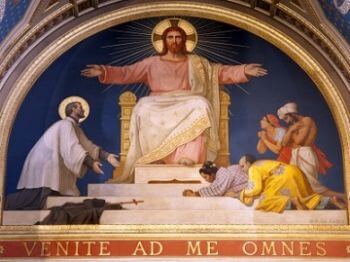 When the Gospels have multiple versions of the same story – or variations thereof – I find it interesting how (I suspect) most of us tend to gravitate toward a version found in one Gospel over the others. For example, the Beatitudes we most often reference are from the Sermon on the Mount in the Gospel of Matthew (5:3-12), although the Sermon on the Plain (from Luke 6:20-26) has four of the same blessings (along with four woes). Likewise when we think about the Lord’s Prayer in the Gospels, we tend to gravitate toward Matthew 6:9-13 rather than Luke 11:1-4.
When the Gospels have multiple versions of the same story – or variations thereof – I find it interesting how (I suspect) most of us tend to gravitate toward a version found in one Gospel over the others. For example, the Beatitudes we most often reference are from the Sermon on the Mount in the Gospel of Matthew (5:3-12), although the Sermon on the Plain (from Luke 6:20-26) has four of the same blessings (along with four woes). Likewise when we think about the Lord’s Prayer in the Gospels, we tend to gravitate toward Matthew 6:9-13 rather than Luke 11:1-4.
However, it can often be very interesting to contrast these lesser-remembered versions, because it can be insightful to reflect upon, “What’s different about this one?” or “What was omitted from this version compared to the other?”
Today’s Gospel selection from Luke is interesting because it feels very similar to the Parable of the Talents (from Matthew 25:14-30), but it adds a great deal about rulership. For example, when the servant who was given the most talents in Matthew doubles that investment, the master says, “Well done, my good and faithful servant. Since you were faithful in small matters, I will give you great responsibilities. Come, share your master’s joy.”
In Luke, by contrast, the master replies to the servant with the most gold coins who doubles the investment, “Well done, good servant! You have been faithful in this very small matter; take charge of ten cities.” The parable also begins with Jesus saying, “A nobleman went off to a distant country to obtain the kingship for himself and then to return” . . . and it ends with the nobleman saying, “Now as for the enemies of mine who did not want me as their king, bring them here and slay them before me.” There’s a whole rulership “subplot” going on in this version of the parable that isn’t in Matthew’s version at all!
Since I haven’t read this version of the parable as often, it got me thinking. I’ve reflected upon this Gospel passage before and realized that an interpretation that made sense to me was that the “coins” were knowledge of the mysteries of the kingdom of heaven; using the coins wisely causes them to grow. This interpretation is bolstered by the fact that none of the servants actually “lose” these coins (at worst, they bury them and leave them unused), since we humans don’t lose knowledge personally so much as just leave it unacted and “buried.” But I completely overlooked the “take charge of ten cities” part, or the rulership subplot.
First, let’s look at the whole parable in broad strokes: The servants who make use of the coins to which they were entrusted are each given charge over a number of cities, while the servant who doesn’t do anything with his coin is chastised and has his coin taken away.
If the coins are knowledge of the kingdom of heaven and the more we make use of them, the more responsibility we are given (“the cities”), then what does the rulership subplot mean? Well, our lives are actually two-fold. If we’ve lived a saintly life, then – when we die – we are in heaven and serve God there as part of the communion of saints. But – before then – in this mortal realm, we’re supposed to do our utmost in bring about the kingdom of heaven on Earth. (That’s part of how we become saints!)
In this way, if we think of the kingdom of heaven here on Earth as an actual, physical “fiefdom,” then those who has shown great stewardship of those heavenly ideals on Earth would often be “in charge” of larger “cities.” It’s the same way that Saint Teresa of Calcutta – when she was Mother Teresa – founded the Missionaries of Charity and did great work around the world. Or how Saint Elizabeth Ann Seton built America’s first Catholic school for girls and founded the Sisters of Charity, the first American congregation of religious sisters.
Today’s Alleluia proclamation is adapted from John: “I chose you from the world, to go and bear fruit that will last, says the Lord.” The knowledge we have of heaven’s kingdom will bring about the “fruit that will last,” both in the form of our own salvation in heaven and in the form of works we bring forth here on Earth. Those who do not want God as their “king” will be “slain before him”; heaven’s kingdom does not reject them, but rather they have rejected heaven’s kingdom.
Christ has always shown us that the smallest of efforts or beliefs can yield amazing results for God, whether discussing mustard seeds, gold talents, or the smallest donation from a widow. We need to trust God, believe in Christ’s words and sentiments, and do our best to grow our hearts, minds, and deeds to make ourselves ready for the coming kingdom . . . as we help make the kingdom a little truer for the Earthly world.
Today’s readings: Rv 4:1-11; Ps 150:1B-2, 3-4, 5-6; Jn 15:16; Lk 19:11-28
